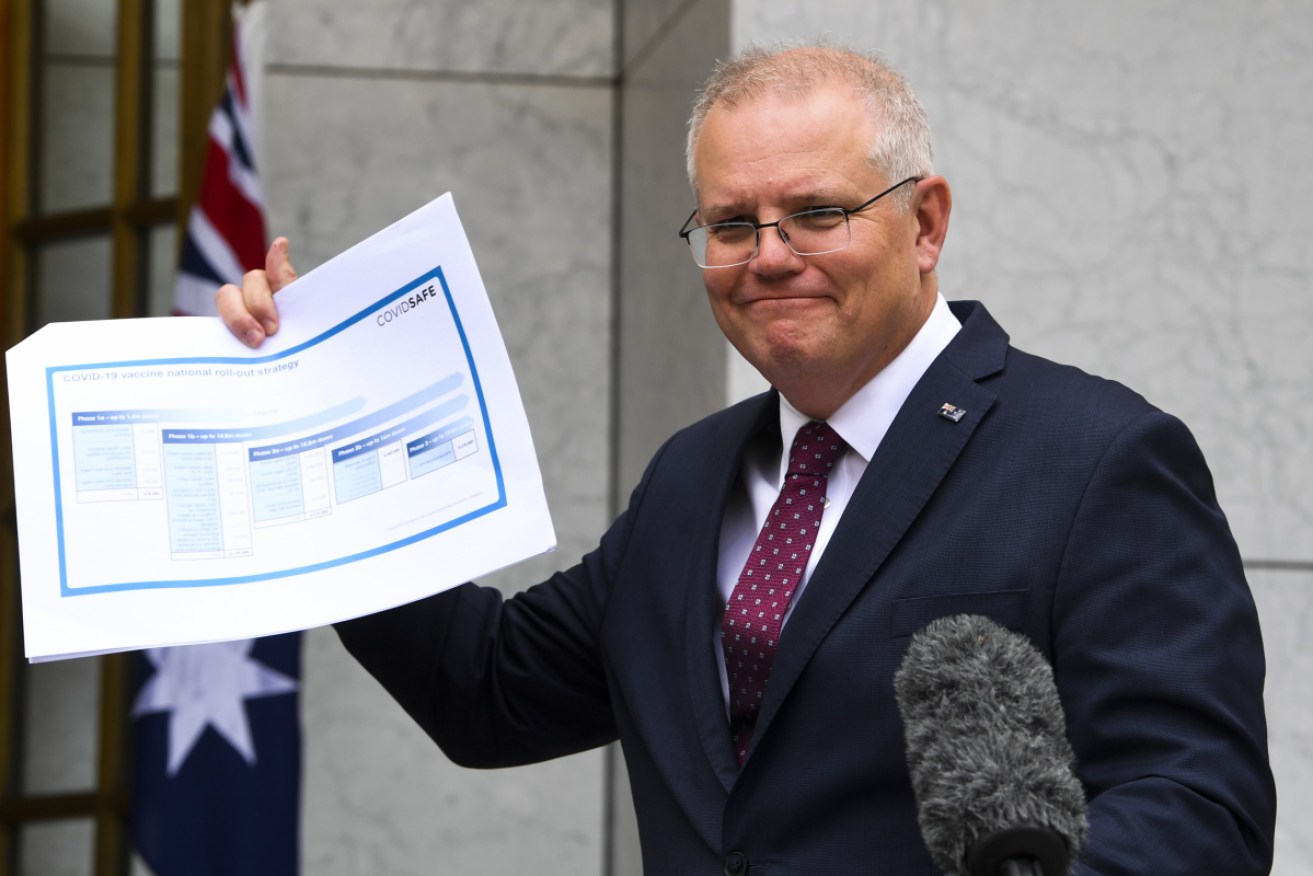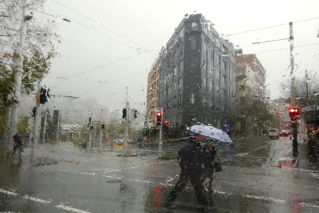First Australian vaccines in February, as Morrison plans ‘televised jab’


Scott Morrison unveils the vaccine plan.
The federal government has again sped up its planned rollout of COVID vaccines in the face of mounting pressure, pledging for first jabs to begin in “mid-to-late February” and the Prime Minister planning to get one on live television.
“There has been no delay. This is going as fast as possible,” Scott Morrison said in Canberra on Thursday, as he and Health Minister Greg Hunt unveiled the national vaccine rollout plan.
The government hopes four million people will be vaccinated by the end of March.
Labor has branded the new timetable, a major change from that outlined on Monday, a “backdown under political pressure”.
Priority groups first
Health and aged-care workers, those working at international borders and in hotel quarantine, and elderly Australians will be the first to be protected, likely to receive jabs of the Pfizer vaccination at 50 specialised “hubs” nationwide within weeks.
Some 680,000 people will be included in that ‘Phase 1a’ of vaccinations, under the plan, after Mr Morrison said the Therapeutic Goods Administration was able to speed up its approval process.

Greg Hunt shows the priority groups at a press conference on Thursday. Photo: AAP
Phase 1b, to begin soon after that priority group, will include 6.139 million people.
People aged 70 and over, Indigenous Australians over 55, and other health workers will be among that group.
So too will be “critical and high-risk workers” like police, defence, fire, emergency services, and workers in meat processing plants where COVID infections have run rampant.
Some two million people with underlying health conditions or a disability will also be in Phase 1b. Adults aged 50 and above will be in Phase 2a, while people aged under 49 will be the last adult groups vaccinated.
Mr Morrison said himself and a small number of key cabinet ministers, state Premiers and federal Opposition members will get their vaccinations on television, to boost public confidence in the vaccine rollout.
Mr Hunt said politicians didn’t want to be “queue jumpers”, but similar to leaders like incoming US President Joe Biden, he said it was important for ministers to show they had confidence in the rollout.
TGA process accelerated
The government has come under fire from the Labor Opposition and some leading epidemiologists for being slower than other countries in beginning vaccinations.
More than a dozen nations including the US, UK, China, Israel, Canada, Germany, France and through the European Union have begun vaccines, but nearly all have approved the vaccines under emergency or special authorisation processes.
In contrast, Australia has committed to a “a full safety assessment process” from the TGA before administering needles. But the timetable for the jabs has changed several times in recent days.

Vaccines are planned to begin in February. Photo: Getty
This week alone, chief medical officer Paul Kelly on Monday said the timetable was looking at a “late March” rollout, then Mr Hunt on Wednesday said “early March”.
Mr Morrison said the new “mid to late February” timetable comes after the TGA was able to move forward its projections.
The Pfizer vaccine is expected to be approved in late January, with the University of Oxford and AstraZeneca vaccine to be ticked in February.
Labor’s shadow health minister Chris Bowen called the new timetable a “backdown”.
Morrison and Hunt said vaccinating in February would be dangerous and irresponsible. Now they are saying it exactly what they will do. This is a backdown under political pressure, nothing more, nothing less.
— Chris Bowen (@Bowenchris) January 7, 2021
The PM said the vaccine stocks would arrive in Australia two weeks after the TGA approval, then federal authorities would take another week or so to test and approve the actual batches before they were injected.
TND has contacted Pfizer for comment. A company spokesperson said it would provide “10 million doses of their vaccine candidate for COVID-19 over 2021, subject to regulatory approval.”
Health department secretary Professor Brendan Murphy, the nation’s CMO during the first stages of the pandemic, said the TGA process had been “extraordinarily expedited”.

Brendan Murphy said the approval had been “expedited”. Photo: AAP
He said between 30 and 50 “Pfizer hubs” would be established nationwide, where people would receive that vaccine.
The Pfizer vaccine needs special storage at super cold temperatures below minus-70 Celsius, and is difficult to distribute very widely due to lack of facilities.
The AstraZeneca vaccine, which is easier to store and distribute, will be given at more than 1000 places nationwide, including GPs offices and medical clinics.
Despite the encouraging news, Mr Morrison said “COVID-safe” arrangements would be needed until at least the end of 2021. He said vaccines would not be a “silver bullet”.








